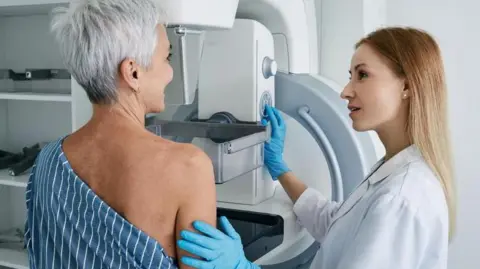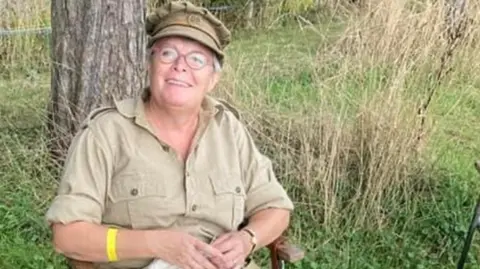Call for NHS to give women with dense breasts extra cancer scans
44 minutes agoNick TriggleHealth correspondent•@nicktriggle

 Getty Images
Getty ImagesWomen with very dense breasts should be offered additional scans as part of the UK’s NHS breast screening programme to help detect more cancers and save lives, researchers say.
A Cambridge University-led study of more than 9,000 women found using different scans from traditional mammograms could treble the number of cancers detected in this group of women.
Around one in 10 women have very dense breasts and they have a higher risk of developing breast cancer, however cancers are harder to spot in dense breasts because of the way mammograms (breast x-rays) work.
This is because they look whiter on the x-rays, the same colour as early-stage cancers.
The trial tested different scanning methods on women with very dense breasts who had been given a mammogram and told they did not have cancer.
It is only through mammograms that women and their health professionals can identify breasts that are very dense.
‘Extra scan spotted my cancer’
Louise Duffield, 60, from Ely, Cambridgeshire, was one of the trial participants who had an early-stage breast cancer diagnosed.
She had surgery to have the tumour removed within weeks.
She says it was a “big shock” when she got the diagnosis.
“It’s been a stressful time and it’s a huge relief to have it gone. The tumour was deep in the breast so if I hadn’t been on the trial, it could have gone unnoticed for years.”

 Other
OtherThe study, published in The Lancet, found two alternative methods, an enhanced mammogram and a fast MRI scan, detected 17-19 cancers per 1,000 women screened.
Both techniques use injections to make blood vessels more visible – tumours in the breast have a lot of blood vessels.
By contrast, traditional mammograms detect eight cancers in every 1,000 women screened. This amounts to more than 20,000 cancers currently detected each year.
Women aged 50 to 71 are invited for breast screening every three years and around two thirds take up the offer.
Based on the study results and that level of uptake, using the different scanning techniques on women with very dense breasts could identify 3,500 extra cancers per year and potentially save 700 lives.
‘Time to change approach’
Prof Fiona Gilbert, who led the research, said she was convinced the new approach could make a difference.
“We need to change our national screening programme so we can make sure more cancers are diagnosed early, giving many more women a much better chance of survival.”
The Department of Health and Social Care said its screening advisory body had been looking at ways to improve detection rates in women with very dense breasts for a number of years.
It said it would be reviewing the findings of this trial, but it was determined to “fight cancer on all fronts” to improve survival rates.
A new national cancer plan for England is expected to be published later this year.